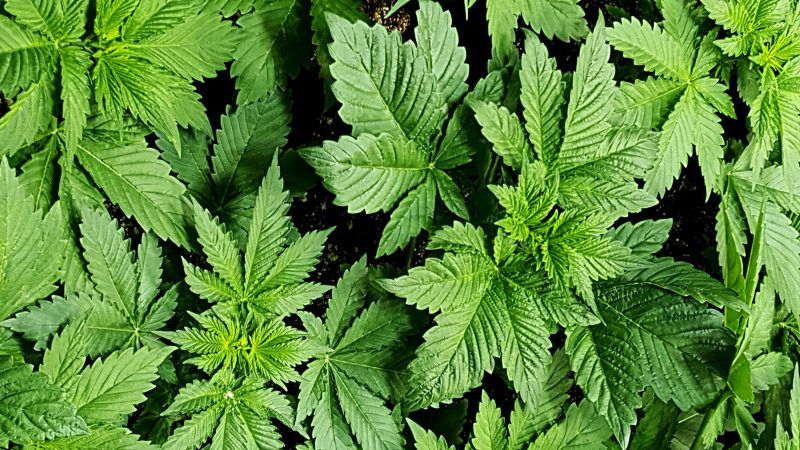Although 44% of Americans Live in States That Have Legalized Pot, Federal Prohibition Is Not Likely to End Anytime Soon
The president supports the ban, and his fellow Democrats do not seem serious about attracting Republican support for repealing it.

As of today, recreational use of marijuana is legal in New Mexico, and the same thing will happen in Virginia and Connecticut on Thursday. Those states join two others that also legalized marijuana this year: New Jersey, which eliminated penalties for possessing up to six ounces in February, and New York, where possessing three ounces or less has been legal since March. Counting the other states that have legalized marijuana since 2012 (but excluding South Dakota, where a successful 2020 ballot initiative is tied up in litigation), 18 states will allow recreational use by the end of the week, representing 44 percent of the U.S. population.
Meanwhile, the federal government continues to treat marijuana as a highly dangerous drug with no legitimate uses. Simple possession of any amount is a misdemeanor punishable by up to a year in jail, while cultivation and sale are felonies punishable by a prison term of five years to life, depending on the amount.
In the eyes of the federal government, cannabis consumers are criminals so untrustworthy that they do not deserve Second Amendment rights, and they can go to prison for up to 10 years if they try to exercise them. State-licensed marijuana businesses are criminal enterprises, protected from prosecution and civil forfeiture only by the Justice Department's enforcement discretion and an annual spending rider that is limited to medical use.
Although nearly 70 percent of Americans think marijuana should be legal, that step is too radical for President Joe Biden, a supposedly reformed drug warrior who favors eliminating federal criminal penalties for simple possession but otherwise wants to maintain the longstanding conflict between state and federal marijuana laws. To give you a sense of how retrograde Biden's position is, President Jimmy Carter endorsed federal decriminalization way back in 1977, when Biden was serving his first term as the junior senator from Delaware and just 28 percent of Americans supported legalization.
The rest of Biden's party is much more receptive to repealing the federal ban on marijuana. According to a recent Quinnipiac University poll, 78 percent of Democrats favor legalization. So did nearly all of the candidates that Biden beat for the 2020 Democratic presidential nomination, including the California senator who became his vice president. The MORE Act, a bill that would have ended federal prohibition, passed the House in December with support from 97 percent of the Democrats who voted on it.
Still, it's not clear that Democratic legislators actually want to legalize marijuana. The MORE Act, which was reintroduced last month, attracted support from just five Republicans. It is chock-full of new regulations, taxes, and spending programs that seem designed to repel even Republicans who are sympathetic to the idea that the federal government should not interfere with state marijuana policies (a position that Biden also claims to favor). When the House approves the MORE Act again and it predictably fails to pass the Senate, Democrats will be able to say they tried to legalize marijuana, but Republicans would not let them. They will not be able to say they made an earnest effort to attract bipartisan support.
Even if they did, Biden has made it clear he is not inclined to sign any bill that eliminates federal prohibition. His administration's position is essentially the same as the policy during Barack Obama's administration, when Deputy Attorney General James Cole urged federal prosecutors to deprioritize cases against state-legal marijuana businesses.
Donald Trump's first attorney general, Jeff Sessions, rescinded that 2013 memo in 2018. But no crackdown followed, and Sessions' successor, William Barr, did not even try to instigate one.
"I'm not going to go after companies that have relied on the Cole memorandum," Barr said in 2019. "My approach to this would be not to upset settled expectations and the reliance interests that have arisen as a result of the Cole memorandum. Investments have been made, so there [has] been reliance on it. I don't think it's appropriate to upset those interests."
Barr also said the conflict between state and federal marijuana laws, which exposes state-licensed cannabis suppliers to the risk of imprisonment and property confiscation while complicating their business in numerous ways, is "untenable." And while Barr made it clear that he was no fan of legalization, he said Congress should change federal law if it wants the states to be free to set their own marijuana policies.
This week Supreme Court Justice Clarence Thomas likewise criticized the federal government's "contradictory and unstable" marijuana policy. "Once comprehensive, the Federal Government's current approach is a half-in, half-out regime that simultaneously tolerates and forbids local use of marijuana," Thomas wrote, dissenting from the Court's decision against considering a case involving Section 280E of the Internal Revenue Code, which bars state-licensed marijuana suppliers from deducting their business expenses when they file their federal income tax returns. "This contradictory and unstable state of affairs strains basic principles of federalism and conceals traps for the unwary."
The "untenable" and "unstable" situation decried by Barr and Thomas began a quarter of a century ago, when California became the first of 36 states to allow medical use of marijuana. It seems unlikely that it will be resolved anytime soon.



Show Comments (25)